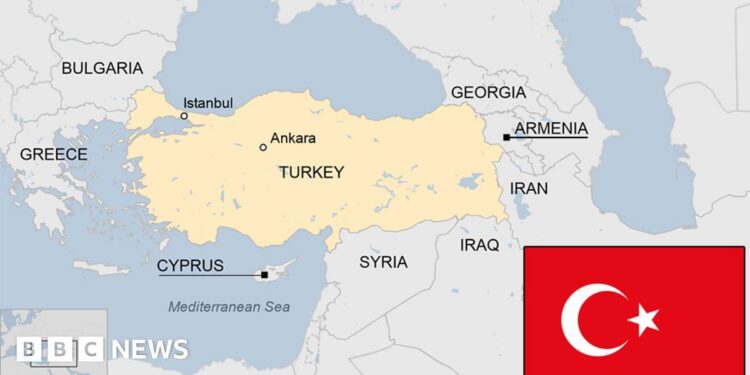Turkey is once again stirring tensions in the Mediterranean, as recent moves by Ankara have raised concerns among regional actors and international observers alike. The country’s latest maritime activities, including expanded exploration efforts and naval deployments, are exacerbating longstanding disputes over territorial waters and energy resources. This escalation threatens to destabilize an already volatile region and complicates ongoing diplomatic efforts aimed at fostering cooperation and peace. In this article, we examine the developments behind Turkey’s renewed assertiveness, the reactions it has provoked, and the potential implications for Mediterranean geopolitics.
Turkey’s Renewed Maritime Claims Heighten Regional Instability
Turkey’s recent declarations over maritime boundaries have reignited longstanding disputes with Greece, Cyprus, and other Eastern Mediterranean stakeholders. These renewed claims challenge internationally recognized exclusive economic zones (EEZs), threatening to destabilize a fragile geopolitical landscape already strained by energy exploration and military posturing. The Turkish government insists on revisiting agreements it deems unfair, pushing naval operations and hydrocarbon drilling activities in contested waters, which has prompted swift reactions from neighboring states and the European Union.
Key points driving regional apprehension include:
- Unilateral seismic surveys in disputed maritime zones
- Expansion of Turkey’s continental shelf claims beyond previous accords
- Heightened military presence near Greek islands and Cypriot waters
- Diplomatic standoffs at international forums and NATO meetings
| Country | Claimed Maritime Area (sq km) | Recent Naval Deployments |
|---|---|---|
| Turkey | 45,000 | Increased patrols near Kastellorizo |
| Greece | 65,000 | Naval exercises around Eastern Aegean islands |
| Cyprus | 30,000 | Escort missions for drilling rigs |
Impact of Ankara’s Actions on EU and NATO Relations
Turkey’s recent maneuvers in the Eastern Mediterranean have exacerbated strains with both the European Union and NATO allies, casting shadows over long-standing partnerships. Ankara’s assertive maritime claims and military activities challenge EU unity, particularly among member states with vested interests in regional stability. The development not only complicates diplomatic engagements but also risks undermining coordinated responses to shared security threats.
Within NATO, Turkey’s actions have triggered concern over alliance cohesion. Several key issues include:
- Strained military collaboration: Divergent strategic priorities are complicating joint exercises and intelligence sharing.
- Political friction: Ankara’s posture pits it against traditional NATO partners, notably Greece and France, eroding trust.
- Risk of escalation: Increased tensions raise the potential for unintended conflicts within the bloc’s southern flank.
| Stakeholder | Primary Concern | Recent Response |
|---|---|---|
| EU Member States | Energy security and maritime law | Sanctions talks and diplomatic warnings |
| NATO Command | Alliance unity and regional stability | Calls for de-escalation and dialogue |
| Turkey | National sovereignty and regional influence | Increased naval patrols and assertive rhetoric |
Strategies for Diplomatic Engagement to De-escalate Mediterranean Tensions
Diplomatic efforts in the Mediterranean demand a multifaceted approach centered on open communication and mutual respect among stakeholders. Establishing continuous dialogue platforms-including trilateral summits and working groups-can create channels for transparency, reducing misunderstandings that often escalate conflicts. Key actions must include leveraging neutral mediators, such as the European Union or United Nations, to facilitate negotiations without bias. Furthermore, confidence-building measures like joint resource management agreements and coordinated maritime exercises can pave the way for collaborative coexistence in contested areas.
A strategic framework focusing on these pillars is crucial for de-escalation:
- Enhanced Monitoring: Deployment of impartial observers to oversee naval activities and ensure compliance with agreed protocols.
- Legal Channels: Utilization of international courts and arbitration bodies to address disputes with binding resolutions.
- Energy Cooperation: Promotion of joint ventures in hydrocarbon exploration to align interests economically.
- Regional Security Dialogues: Encouragement of sustained engagement on broader security issues to build trust beyond immediate maritime claims.
| Strategy | Expected Outcome | Key Players |
|---|---|---|
| Neutral Mediation | Reduced tensions through unbiased facilitation | UN, EU, NATO |
| Joint Resource Management | Shared economic benefits and collaboration | Turkey, Greece, Cyprus |
| Legal Arbitration | Legitimized resolution of disputes | International Court of Justice |
| Security Dialogues | Improved regional cooperation and stability | All Mediterranean states |
To Conclude
As Turkey continues to assert its interests amid competing claims in the Mediterranean, the region faces renewed uncertainty and heightened tensions. With diplomatic efforts yet to yield lasting resolutions, the international community watches closely, wary of the potential for further escalation. The unfolding situation underscores the complex geopolitical dynamics at play and the urgent need for dialogue to prevent conflict in this strategically vital area.
















